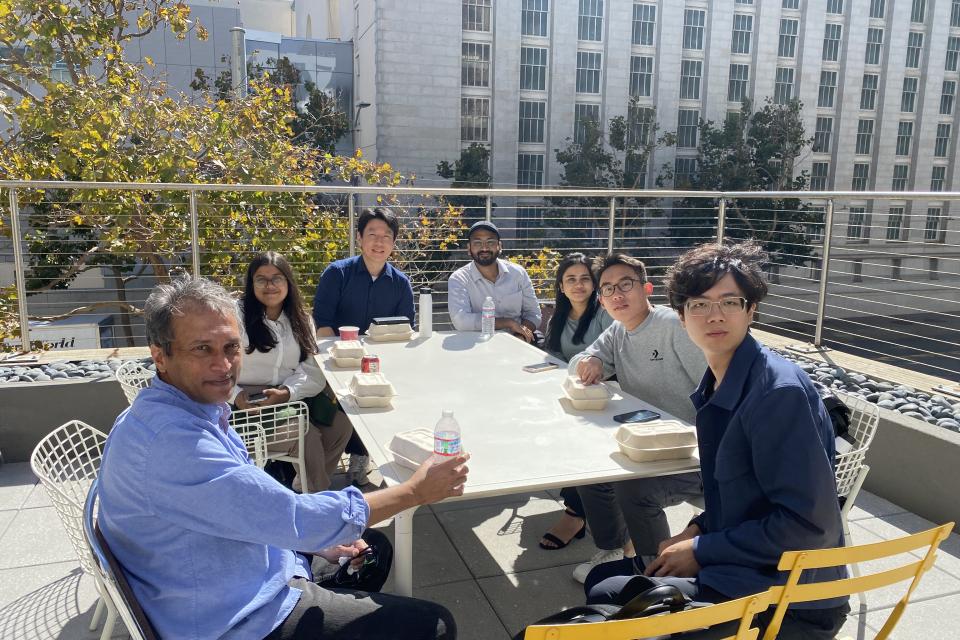My Q&A with Professor Jörn Boehnke, Inspiring the Art of Data Analytics
“You'll have the skills to turn raw data into solid gold.”

After seven years of work experience in business strategy, analytics and operations, I was at a crossroads in my academic and professional life when I opted to pursue Master of Science in Business Analytics at UC Davis and move to the vibrant city of San Francisco.
In the ever-evolving world of data science, it’s critical to have a strong foundation in fundamental concepts, techniques and tools.
One of the standout faculty who is dedicated to our learning success and always available to help us with understanding the concepts behind techniques is Assistant Professor Jörn Boehnke.
With more than 20 years of experience in data analysis, he has played a significant role in shaping the minds and careers of many students, including myself.
Recently, I was thrilled to have the opportunity to ask him about his experiences at the intersection of industry and academia.
I’d like to share highlights from our Q&A:
Can you tell us about your background and how you became interested in machine learning?
My programming interest began with Turbo Pascal in middle and high School, where I was fascinated by its automation capabilities. This passion continued as I studied mathematics and physics, deepening my coding exposure.
During my academic journey, I encountered machine learning, which combined programming, math, and cutting-edge technology. I recognized its potential for real-world impact and embraced the stimulating challenge.
Since then, I've been dedicated to refining my skills, contributing to this rapidly evolving field, and harnessing its potential to address complex problems and transform industries.
Q: What are some of the most exciting developments in machine learning that you have seen in recent years?
In recent years, machine learning has made significant strides, with natural language processing (NLP) emerging as one of the most compelling advancements. Over the past 10-15 years, NLP has undergone a remarkable transformation, showcasing the potential of machine learning in understanding and generating human-like language.
Initially, NLP relied on basic techniques such as the "bag of words" model, which analyzed text by counting word occurrences, without considering context or grammar. This approach laid the groundwork for more sophisticated methods.
One of the most groundbreaking developments in NLP has been the emergence of cutting-edge word prediction algorithms, like the "GPT" series. These transformer-based models can generate coherent, contextually relevant text, demonstrating an unparalleled level of natural language understanding.
GPT models have expanded the possibilities for applications such as chatbots, virtual assistants, content generation and translation.
These exciting developments in NLP highlight the rapid progress of machine learning and hint at even more innovative breakthroughs in the coming years, as we work towards creating increasingly intelligent and human-like processing systems.
How do you ensure that all students in your class have a chance to succeed, regardless of their background or learning style?
To ensure all students can succeed, regardless of their background or learning style, I create an engaging and inclusive classroom atmosphere that encourages active participation in discussions.
Additionally, I am consistently available outside class hours for extra support.
To promote equity and inclusiveness, I have integrated the online learning platform Piazza into my teaching, enabling students to ask questions and voice concerns anonymously. This fosters an environment where everyone feels comfortable expressing their thoughts and seeking clarification.
Moreover, I collaborate with the UC Davis Center for Educational Effectiveness to conduct mid-quarter Inquiries, gathering valuable feedback to make necessary adjustments to my courses. By doing so, I tailor my teaching strategies to accommodate various learning styles, ensuring a well-rounded and enriching experience for all students.
What advice would you give to students who are interested in pursuing a career in machine learning?
Stay curious. Always understand the “behind-the-scenes” of the models you want to employ. And when people ask you what you do for a living, just smile and say, “I teach computers to learn, think, and sometimes take over the world. But mostly, I debug code.”
What are some of the most important skills that students in a master’s in business analytics program should focus on developing?
Communication of findings!
One of the most crucial skills for students pursuing a master's in business analytics is effective communication of their findings.
Although our students excel in data analytics, their ability to convey results clearly and engagingly is often underdeveloped. Enhancing this skill allows students to better showcase their insights and make a stronger impact in professional settings, bridging the gap between data-driven analysis and real-world decision-making.
Can you speak to the career prospects for MSBA graduates?
With a master's in business analytics, you'll have the skills to turn raw data into solid gold, making you the alchemist every company desperately wants.
How do you see the field of business analytics evolving in the coming years?
In the coming years, business analytics will not only develop much more of its own lingo, making it the “hippest” field around, but also witness a significant shift towards real-time decision-making, powered by AI-driven automation and advanced data visualization tools. This will enable businesses to quickly adapt to ever-changing market conditions and make more informed, data-driven decisions to stay ahead of the competition.


